| Srl | Item |
| 1 |
ID:
090691
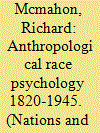

|
|
|
|
|
| Publication |
2009.
|
| Summary/Abstract |
This article examines ethnic stereotypes in biological race classification of Europeans between the 1830s and 1940s as part of political discourse on national identity. Anthropologists linked physical-psychological types to nations and national character stereotypes through 'national races', achieving an often quite enduring international consensus on each race's mentality. The article argues that race mentality narratives were therefore partly dictated by their place within a dynamic interlocking European system. I focus on two key interacting elements that structured this system: the central role of the Germanic-Nordic blond and the geographically uneven process of modernisation. I consider the spatiality of socio-cultural and political factors 'external' to the stereotype system, such as geopolitics and modernisation, but also emphasise that discursive relationships between national stereotypes helped structure the international stereotype system. My conclusion argues for greater consideration of the influence of both scientific and international systemic factors in research on national identity
|
|
|
|
|
|
|
|
|
|
|
|
|
|
|
|
| 2 |
ID:
090698


|
|
|
|
|
| Publication |
2009.
|
| Summary/Abstract |
This article argues for dissolving the civic-ethnic dichotomy into several analytical dimensions and suggests 'autochthony' and 'activism' as two such alternatives. It does so by first presenting a case study of Irish language revivalism and identity discourses in the North of Ireland, in which locals turn out to be both 'civic' nationalists and 'ethno'-cultural revivalists. The article then advocates treating these aspects as belonging to two distinct dimensions: the first is concerned with the causal logic underlying the reproduction of nationhood in terms of autochthony, while the second specifies different forms of activism aimed at (re)constituting the nation. Finally, reinterpreting the empirical case in terms of these two dimensions, it is shown that the type of activism is dependent on the specificities of 'threats' to the nation rather than on the underlying type of autochthony, which further substantiates the necessity to disambiguate the civic-ethnic distinction
|
|
|
|
|
|
|
|
|
|
|
|
|
|
|
|
| 3 |
ID:
090695
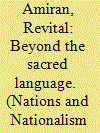

|
|
|
|
|
| Publication |
2009.
|
| Summary/Abstract |
This paper aims to shed light on the evolution of the Jewish national language and to discuss the ways in which the cultural trends in Zionism constantly left room for the creative imagination of its adherents, and functioned in such a way as to erode its sacred dimension, thereby promoting a discourse focusing on the individual. My claim is that the Hebrew language case study may reflect the importance not only of national revisionist accounts for our understanding of the Zionist movement, but also the need for an approach that saves a place for truly creative aspects of civic engagement, and recognises the Israeli nation as one asserting, besides its ethnic ties also patriotic nexuses. Special attention will be given to the phenomenon of Hebrew poetry written by women in the 1920s as a platform from which to examine the unique meaning and evolution of language within the Jewish national movement.
|
|
|
|
|
|
|
|
|
|
|
|
|
|
|
|
| 4 |
ID:
090693
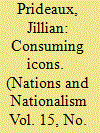

|
|
|
|
|
| Publication |
2009.
|
| Summary/Abstract |
In extension of Billig's (1995) and Edensor's (2002) contribution to the literature, this paper examines an often overlooked element in 'mundane' nationalism, company advertising. Through the development of a typology of advertising strategies, it examines the role of companies as nationalist actors, and highlights how advertisements can engage with and impact on wider national discourses. Nationalist company advertising is classified into types, depending on how associated the company is with nationalism in popular discourse, and whether the advertising campaign involves the company's participation in broader nationalistic political projects. The types developed in this typology include (1) 'ordinary marketing/achieving nationalist credentials', (2) 'ordinary marketing/established nationalist credentials' and (3) 'activist marketing/achieving nationalist credentials'. Case studies from the Australian context are used to illustrate these types, how the different types use nationalism, and their varying impact on shaping wider nationalistic discourses.
|
|
|
|
|
|
|
|
|
|
|
|
|
|
|
|
| 5 |
ID:
090696
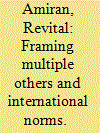

|
|
|
|
|
| Publication |
2009.
|
| Summary/Abstract |
This paper analyses the discourse of the migrant worker advocacy movement in South Korea to examine how activists' strategic framing can expedite the mobilisation of international norms despite significant cultural barriers. Korean activists argue on behalf of migrant workers that adopting international norms will help the Korean nation gain more respect from other nation-states and that international norms are not antithetical to the true nature of the Korean nation. These framing strategies have enabled Korean activists to mobilise international norms despite cultural barriers. However, such a framing strategy does not cultivate a truly inclusive nationhood; Korean activists have circumvented cultural barriers, but have not overcome or transformed them
|
|
|
|
|
|
|
|
|
|
|
|
|
|
|
|
| 6 |
ID:
090697


|
|
|
| 7 |
ID:
090692
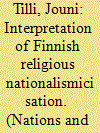

|
|
|
|
|
| Publication |
2009.
|
| Summary/Abstract |
The topic of this article is the relation between 'politicality' and theology in the discourse of Finnish religious nationalism during the Winter War of 1939-40 and the Continuation War of 1941-44. I shall draw on the ideas of Kari Palonen and Anthony D. Smith in attempting to thematise theological depoliticisation as an intrinsic element of religious nationalism. Also, I will elaborate its political significance in the Finnish context, where the role of traditional religion in the general development of nationalist thought has been particularly important. The specific focus is on how prominent representatives of the Finnish clergy related to war and nationalist claims in general. My interpretation is that their arguments were drawn from what I call the topoi of theological depoliticisation, which, at the same time, rendered the discourse extremely political.
|
|
|
|
|
|
|
|
|
|
|
|
|
|
|
|
| 8 |
ID:
090694


|
|
|
|
|
| Publication |
2009.
|
| Summary/Abstract |
What happens if a community is encouraged to imagine itself visually when its political vessel is a modernising nation-state within a multinational communist federation? Cinematic works, in their distillation of time and space, contribute to the kinds of imaginings that sustain nation-states. How this cultural technology reflected and promoted nation-building in the Soviet era is the subject of this article. It explores how the tensions within the diktat 'national in form, socialist in content' played out in practice in the Soviet cultural landscape of 1960s Kyrgyz film, dubbed by Soviet critics as a 'wonder'
|
|
|
|
|
|
|
|
|
|
|
|
|
|
|
|